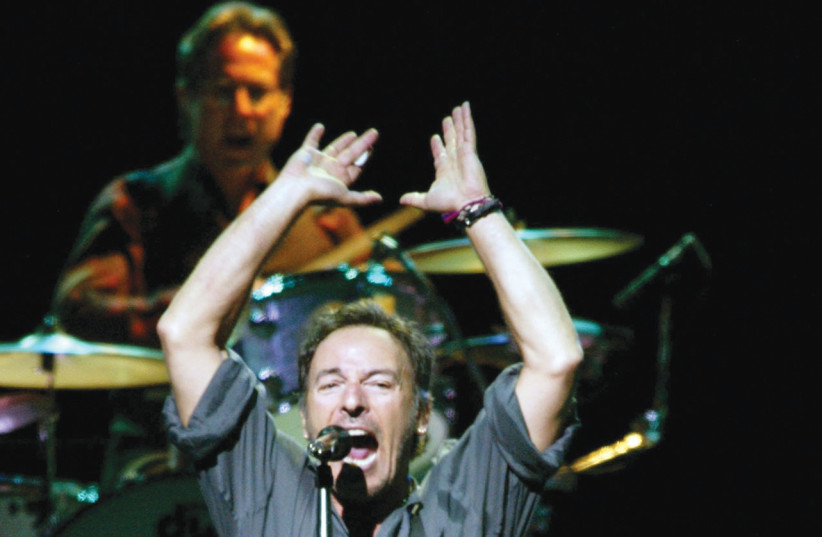Passover, finding freedom: From Yannai to Bruce Springsteen

Unlike Yannai, Springsteen recognizes that the truest redemption happens within the individual: in the blessed, rare moments of the night, out of reach of the cruel binaries of boss man and worker
The payyetan (liturgical poet) Yannai lived and flourished in the Land of Israel some time between the fifth and seventh centuries. With the magnificent literary discoveries found in the Cairo Geniza, Jewish scholars have recovered a vast portion of his hazzana (Arabic for “cantorial collection”), enriching Jewish literature immeasurably.
Rock artist Bruce Springsteen lives and flourishes in New Jersey. His more than 50 years of hard-driving, emotionally complex music and lyrics define the American songbook. They speak with unparalleled poignancy and pathos to the lives and dreams of millions of Americans and others. His ubiquitous presence in contemporary culture has deepened our lives immeasurably.
I’ve always assumed that these two poets, separated by millennia and vastly different experiences, would never have understood each other. For instance, both use biblical imagery but for radically disparate reasons.
In Yannai’s religious world and words, I am propelled into the endless arms of God the anguished lover:
For God’s people’s distress is God’s distress
And their salvation is God’s own. (From “Ahar Hamidbar,” “Into the Wilderness”)
In Springsteen’s secular world and words, I am repelled by the timeless hatred of every Cain for his brother:
In the Bible Cain slew Abel
And east of Eden he was cast;
You’re born into this life paying
For the sins of someone else’s past. (From “Adam Raised a Cain”)
In a sense, I’ve bounced between the worlds and words of writers like these two men, and what they symbolize, all my adult life. I’ve struggled to integrate the many truths of secular and religious experience within myself and within my piece of the world at large. This Passover, I’ve perhaps found in both poets’ writings small, yet fruitful, common ground.
This is because Yannai and Springsteen both write about the liberation that we experience at night.
Passover: Yannai's hymns thanking God for freedom
On the first Seder night, Ashkenazi Jews sing Yannai’s hymn of gratitude to God for redeeming the Israelites, and subsequent generations of Jews, from slavery and oppression bachatzi halayla, at midnight:
And it came to pass at midnight!
Often You, God, performed wondrous miracles at night.
At the beginning of the watches of this night.. (Passover)
The righteous convert (Abraham) prevailed
When he divided his company at night. (Genesis 14:15)
And it came to pass at midnight!...
You smote Egypt’s firstborn at midnight. (Exodus 12:29-32)
The Egyptians did not find their mighty ones at night.
Sisera’s army was defeated through the stars of night. (Judges 5:20)
And it came to pass at midnight!
Yannai employs his trademark poetic techniques of the alphabetic acrostic, rhyme scheme, repetition and biblical/midrashic allusion to tell our long story of repeated deliverance by God at midnight. He bases the entire poem on a quote from Exodus 12:29: “At midnight, God struck down all the male firstborn of Egypt.”
Thus, underlying the poem is the terrible reality that redemption from oppression often happens only as the result of violence, divine and human, the darkest side of existence. But he ends this poem with a plea to God to bring the ultimate exodus, for us and all humanity, during the messianic era, which transcends all violence, all binary realities of dark and light, day and night:
Bring near the day that is neither day nor night.
Exalted One, make known that Yours is the day and the night.
Appoint watchmen to Your city (Jerusalem) all day and all night.
Make light as day the darkness of the night.
And it came to pass at midnight!
Passover, Exodus and Bruce Springsteen's songs of redemption
At any given time of day, one can sing along to Springsteen’s howl of hoped-for personal redemption with his iconic song “Night” from the album Born To Run:
You get up every morning at the sound of the bell.
You get to work late and the boss man’s giving you hell.
Until you’re out on a midnight run
Losing your heart to a beautiful one, and it feels right…
As you lock up the house, turn out the lights
And step out into the night.
And the world is busting at its seams
And you’re just a prisoner of your dreams
Holding on for your life
’Cause you work all day
To blow ’em away in the night.
“The Boss” is writing about the nightly exodus of the “working man” from the modern Pharaoh: the mind-numbing, abusive American workplace that robs so many of their dignity and hope.
The song proceeds with a fantastic account of shattered people finding post-work, nocturnal wholeness in the fast car rides and romances of working-class America:
She’s so pretty that you’re lost in the stars
As you jockey your way through the cars
And sit at the light, as it changes to green
With your faith in your machine
Off you scream into the night.
Unlike Yannai, Springsteen recognizes that the truest redemption happens within the individual: in the blessed, rare moments of the night, out of reach of the cruel binaries of boss man and worker, daytime drudgery and nighttime deliverance:
Hell, all day they’re busting you up on the outside,
But tonight you’re gonna break on through to the inside
And it’ll be right, it’ll be right
And it’ll be tonight…
You run sad and free
Until all you can see
Is the night.
Yannai’s sacred hymn, Springsteen’s profane song; Yannai’s Jewish people, Springsteen’s working-class individual; Yannai’s outer redemption from oppression, Springsteen’s inner liberation in the midst of oppression; Yannai’s God as redeemer, Springsteen’s “everyman” fighting nightly for redemption.
The two artists’ ideas could not be more different, and yet as we’ve seen, they could not be more similar. This is because Yannai and Springsteen both write about the liberation that we experience at night.
Beyond their references to experience at night in real-time, Yannai and Springsteen are using the night as a provocative symbol for the darkness in which we all find ourselves during our lives. Certainly, people who are politically, economically and physically oppressed live in the worst darkness of all. But even the freest of us enter, at times, the deep dark of spiritual, moral and psychic crisis, the nighttime from which we feel we can never escape.
Why, then, such joy from our poets about redemption at night? Because they recognize that however agonizing and slow, despair does dissipate as morning comes and light arises. Night is their metaphoric way of entering the mystery of the human journey that, like the nighttime, covers us as we sleep and prepare for a new day.
Their words, like the Passover story, like the struggle of every person to be free in every sense of that word, point toward the hard-borne gift that God gave to us in that primordial time – when night and day passed over the first people on Earth. That gift is hope.
Jerusalem Post Store
`; document.getElementById("linkPremium").innerHTML = cont; var divWithLink = document.getElementById("premium-link"); if (divWithLink !== null && divWithLink !== 'undefined') { divWithLink.style.border = "solid 1px #cb0f3e"; divWithLink.style.textAlign = "center"; divWithLink.style.marginBottom = "15px"; divWithLink.style.marginTop = "15px"; divWithLink.style.width = "100%"; divWithLink.style.backgroundColor = "#122952"; divWithLink.style.color = "#ffffff"; divWithLink.style.lineHeight = "1.5"; } } (function (v, i) { });

